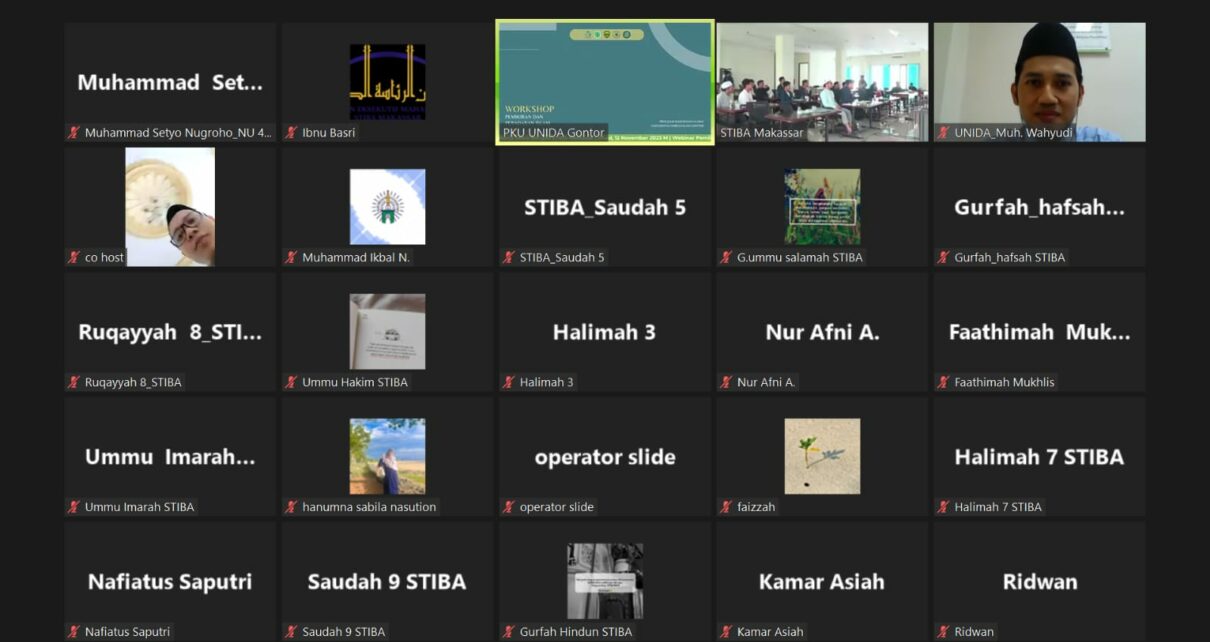
(STIBA.ac.id) Makassar – Collaborating with the Cleric Cadre Program (PKU) of the 17th Generation at Darussalam University (UNIDA) Gontor, STIBA Makassar organized a Workshop Seminar on Islamic Thought and Islamic Civilization on Sunday, November 12, 2023. The event was held in a hybrid format involving five speakers, all from the Cleric Cadre Program from both campuses, where three of them were students from the Cleric Cadre Program at UNIDA Gontor, and the other two were students from the PKU program at STIBA Makassar. The event was attended by 35 participants in person at the Mua’dz bin Jabal Hall, while another 51 participants joined the event via Zoom Meeting.
The Vice Chairman I of Academic and Student Affairs at STIBA Makassar, Ustaz Rahmat Badani bin Tempo, Lc., M.A., officially opened the event. In his opening remarks, he emphasized the position of knowledge in Islamic religion and the importance of the role of scholars as carriers of that knowledge.
Ustaz Rahmat emphasized that the community’s attention to knowledge and scholars must continue to be observed, especially in facing the challenges of the ever-evolving times, such as the proliferation of deviant thoughts. In his concluding remarks, he expressed hope for a closer collaboration between UNIDA Gontor and STIBA Makassar to safeguard the existence of knowledge and the role of scholars among the community.
The next address was delivered by Ustaz Muhammad Wahyudi, M. Pd., a lecturer and mentor at UNIDA Gontor. He affirmed that UNIDA Gontor and STIBA Makassar share the same foundation, namely piety and the spirit to preserve the existence of knowledge and the role of scholars. Ustaz Wahyudi also suggested that the younger generation should pay more attention to knowledge as an effort to face the challenges of the times, as expressed by Ustaz Rahmat, as a form of jihad in this era.
The activity continued with a session of seminar material presentations by the speakers. Ustaz Randy Wahyudi, S.E., opened the first session with the title “Problem Concepts of Neo-Capitalism Production and Ecological Impact.” In his explanation, he criticized the Western capitalist production concept that adopts a materialistic approach, encouraging humans to exploit nature on a large scale. Referring to the book Al-Kasb by Imam Syaibaniy, he outlined the concept of production in Islam that not only emphasizes the benefits from nature but also considers human ethics in interacting with nature.
The session continued with a presentation by Ustaz Jalaluddin, S. Pd., who delivered a material titled “Crisis in the Teacher-Student Relationship in Schools (Viewed from the Perspective of Imam Badruddin Ibn Al-Jama’ah).” Ustaz Jalaluddin discussed serious issues in etiquette, both among teachers as educators and students as learners, reflected in the increasing related cases. He provided solutions by detailing the views of Imam Badruddin ibn Al-Jama’ah found in the book Tazkiratussami Walmutakallim as an effort to overcome the crisis in etiquette in this field.
Moving on to the field of jurisprudence (fikih), the third material was presented by Ustaz Muhammad Setyo Nugroho, Lc., M.H., with the title “Limitations of Differences of Opinion in Fikih.” In his presentation, he emphasized that the scope of differences of opinion in fikih should not include matters that are fundamental or foundational. Ustaz Setyo Nugroho also explained the limitations of ijtihad in furu’ or branches of jurisprudence, ensuring they do not result in deviant views.
From the field of hadith studies, the fourth material was presented by Ustaz Arfan Arifuddin, S.S., M.Ag., with the title “Limitations of the Interpretation of the Hadith ‘You are More Knowledgeable about Worldly Affairs.'” His explanation addressed complex questions about the meaning of the hadith, such as “Does the entire worldly affairs understood better by the people, so that the Sharia does not encompass it at all?”
He delved deep into these questions, showing the need for accurate understanding of the hadith.
As the final speaker, Ustaz Muslimin Qasim, S.H., presented material in the field of Arabic language with the title “Methods of Teaching Arabic According to Azhar Arsyad.” He highlighted the importance of the Arabic language for Muslims. Meanwhile, in examining various methods of teaching Arabic, Ustaz Muslimin conducted a study on the Ta’sisiyah method found in the book “Fundamentals of Mastering the Arabic Language” by Azhar Arsyad.
The activity became more interactive with a question-and-answer session after the presentations by all the speakers. Participants, both those present physically and those attending virtually, actively posed their questions in this session. As a conclusion, Ustaz Muhammad Wahyudi, M. Pd., delivered an epilogue. He emphasized that the tasks of students as Islamic learners are still numerous and it is important to increase self-awareness in developing capabilities. He also reminded participants to make the best use of their time during their education at STIBA Makassar as preparation to serve the community.
![]()
